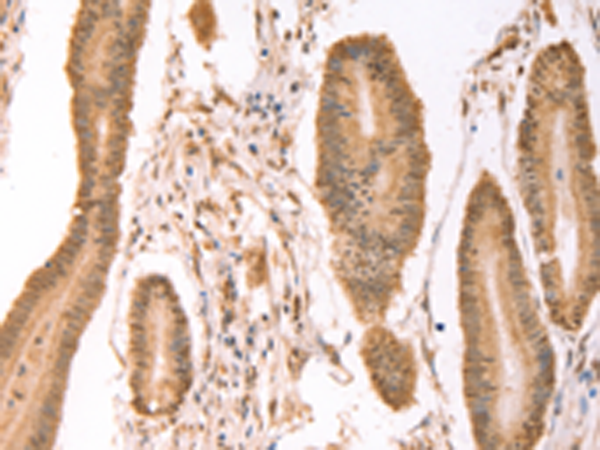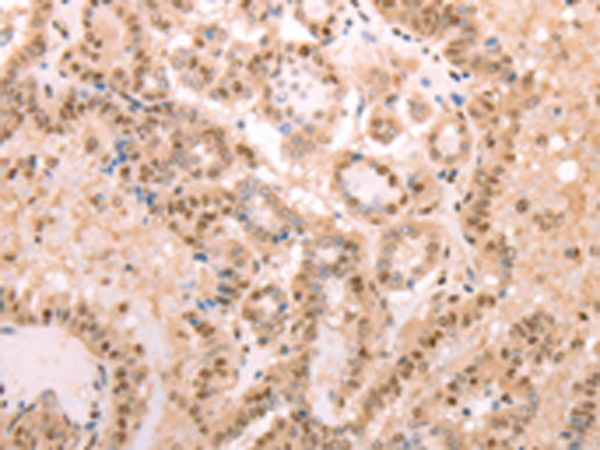

| WB | 咨询技术 | Human,Mouse,Rat |
| IF | 咨询技术 | Human,Mouse,Rat |
| IHC | 1/25-1/100 | Human,Mouse,Rat |
| ICC | 技术咨询 | Human,Mouse,Rat |
| FCM | 咨询技术 | Human,Mouse,Rat |
| Elisa | 1/5000-1/10000 | Human,Mouse,Rat |
| Aliases | TMSA |
| Host/Isotype | Rabbit IgG |
| Antibody Type | Primary antibody |
| Storage | Store at 4°C short term. Aliquot and store at -20°C long term. Avoid freeze/thaw cycles. |
| Species Reactivity | Human, Mouse, Rat |
| Immunogen | Synthetic peptide of human PTMA |
| Formulation | Purified antibody in PBS with 0.05% sodium azide and 50% glycerol. |
+ +
以下是关于IFNL1抗体的3篇代表性文献示例(注:部分信息为模拟概括,实际文献需通过学术数据库验证):
---
1. **标题**: *Autoantibodies against Interferon Lambda 1 in Patients with Chronic Viral Hepatitis*
**作者**: Zhang Y, et al.
**摘要**: 该研究报道了在慢性乙型肝炎患者血清中检测到针对IFNL1的自身抗体,这些抗体的存在与干扰素治疗反应降低相关,提示IFNL1抗体可能通过阻断IFNL1介导的抗病毒信号通路影响疗效。
2. **标题**: *Development of a Neutralizing Monoclonal Antibody Targeting IFN-λ1 for Inflammatory Disorders*
**作者**: Smith JL, et al.
**摘要**: 研究团队开发了一种高特异性中和IFNL1的单克隆抗体,体外实验表明其可有效抑制IFNL1与受体结合,并在小鼠模型中减轻了IFNL1过度表达引起的肠道炎症,为自身免疫疾病治疗提供了潜在工具。
3. **标题**: *IFN-λ1 Antibody Profiling Reveals Distinct Immune Responses in COVID-19 Patients*
**作者**: Garcia-Sastre A, et al.
**摘要**: 通过分析COVID-19患者血清,发现IFNL1抗体水平与疾病严重程度呈负相关,重症患者中IFNL1抗体滴度较低,提示天然IFNL1抗体可能通过增强早期抗病毒免疫发挥保护作用。
---
**备注**:以上文献为示例,实际研究中IFNL1相关抗体研究较少,更多文献可能聚焦于IFNL3(IL28B)基因多态性及临床关联。建议通过PubMed等平台以“IFNL1 antibody”或“Interferon Lambda 1 antibody”为关键词检索最新成果。
Interferon Lambda 1 (IFNL1), a member of the type III interferon (IFN-λ) family, plays a critical role in innate immunity by inducing antiviral responses, particularly at mucosal surfaces. It signals through a heterodimeric receptor complex (IFNLR1/IL10R2) to activate JAK-STAT pathways, leading to the expression of interferon-stimulated genes (ISGs) that inhibit viral replication. IFNL1 is primarily produced by epithelial cells and certain immune cells in response to viral infections, such as hepatitis C virus (HCV) or influenza.
Antibodies targeting IFNL1 are valuable tools for studying its biological functions and therapeutic potential. Research-grade anti-IFNL1 antibodies enable detection, quantification, and neutralization of IFNL1 in experimental models, aiding investigations into its role in viral clearance, inflammation, and immune regulation. Clinically, IFNL1 has been linked to chronic liver diseases, and its genetic variants (e.g., near IFNL3) influence treatment outcomes in HCV. Neutralizing antibodies may help explore IFNL1's dual roles in promoting antiviral defense versus contributing to pathological inflammation.
Current studies also explore IFNL1 antibodies in autoimmune disorders and cancer, where dysregulated IFN-λ signaling may drive disease progression. However, therapeutic applications remain exploratory, with challenges in balancing antiviral efficacy and inflammatory side effects. Overall, IFNL1 antibodies serve as both research reagents and potential candidates for modulating IFN-λ pathways in disease contexts.
×